The Benefits of Early Childhood Education for Children’s Cognitive Development
Early childhood education is an important part of a child’s development, as it provides the foundation for their future learning and growth. Research has shown that early childhood education can have a positive impact on a child’s cognitive development, helping them to develop the skills they need to succeed in school and beyond.
One of the most important benefits of early childhood education is that it helps to develop a child’s language and literacy skills. Through activities such as reading, writing, and storytelling, children are able to learn the basics of language and communication. This helps to build a strong foundation for future learning, as children are able to understand and express themselves more effectively.
Early childhood education also helps to develop a child’s problem-solving skills. Through activities such as puzzles, games, and art projects, children are able to practice their critical thinking and problem-solving skills. This helps to prepare them for more complex tasks in the future, as they are able to think more logically and creatively.
In addition, early childhood education helps to develop a child’s social and emotional skills. Through activities such as role-playing and cooperative play, children are able to learn how to interact with others and develop their social skills. This helps to prepare them for the social world they will encounter in school and beyond.
Finally, early childhood education helps to develop a child’s creativity. Through activities such as music, art, and drama, children are able to explore their creative side and express themselves in unique ways. This helps to foster a lifelong love of learning and creativity.
Overall, early childhood education is an important part of a child’s development, as it provides the foundation for their future learning and growth. Through activities such as reading, writing, problem-solving, and creative expression, children are able to develop the skills they need to succeed in school and beyond.
The Role of Nutrition in Supporting Healthy Growth and Development in Children
Good nutrition is essential for children to grow and develop into healthy adults. It is important to provide children with a balanced diet that includes all the essential nutrients they need to support their growth and development.
Nutrition plays a key role in supporting healthy growth and development in children. A balanced diet provides the necessary energy and nutrients for children to grow and develop properly. It is important to ensure that children are getting enough of the essential nutrients, such as proteins, carbohydrates, fats, vitamins, and minerals. These nutrients are necessary for the body to function properly and for children to reach their full potential.
Protein is an important nutrient for children as it helps to build and repair body tissues. It is also important for the development of strong bones and muscles. Carbohydrates provide energy for the body and are important for brain development. Fats provide energy and help to absorb certain vitamins and minerals. Vitamins and minerals are essential for healthy growth and development, as they help to support the immune system, promote healthy skin, and support the development of strong bones and teeth.
In addition to providing the necessary nutrients, it is also important to ensure that children are getting enough calories to support their growth and development. Children need more calories than adults, as they are growing and developing. It is important to provide children with a variety of foods that are high in calories, such as whole grains, fruits, vegetables, dairy products, and lean proteins.
It is also important to ensure that children are getting enough fluids. Water is essential for the body to function properly and for children to stay hydrated. It is important to provide children with plenty of water throughout the day, as well as other healthy beverages such as milk and 100% fruit juice.
Good nutrition is essential for children to grow and develop into healthy adults. It is important to provide children with a balanced diet that includes all the essential nutrients they need to support their growth and development. It is also important to ensure that children are getting enough calories and fluids to support their growth and development. By providing children with a healthy diet, parents can help to ensure that their children are getting the nutrition they need to reach their full potential.
The Impact of Technology on Children’s Social and Emotional Development

Technology has become an integral part of our lives, and its impact on children’s social and emotional development is undeniable. While technology can be a powerful tool for learning and connecting with others, it can also have a negative impact on children’s social and emotional development.
On the positive side, technology can help children develop important social skills. For example, children can use technology to communicate with peers, learn how to collaborate, and develop problem-solving skills. Technology can also help children build relationships with people from different backgrounds and cultures, which can help them become more tolerant and understanding of others.
On the other hand, technology can also have a negative impact on children’s social and emotional development. For example, too much time spent on technology can lead to isolation and loneliness, as well as a lack of face-to-face interaction with peers. Additionally, technology can be a source of cyberbullying, which can lead to feelings of anxiety and depression.
In order to ensure that technology has a positive impact on children’s social and emotional development, it is important for parents and caregivers to set limits on the amount of time children spend on technology. Additionally, parents and caregivers should monitor the content that children are exposed to and ensure that it is age-appropriate. Finally, it is important to encourage children to engage in activities that involve face-to-face interaction with peers, such as sports, clubs, and other extracurricular activities.
In conclusion, technology can have both positive and negative impacts on children’s social and emotional development. It is important for parents and caregivers to set limits on the amount of time children spend on technology and to monitor the content they are exposed to. Additionally, it is important to encourage children to engage in activities that involve face-to-face interaction with peers.
Strategies for Promoting Positive Mental Health in Children
Encourage Healthy Habits:
Establishing healthy habits early on can help children develop positive mental health. Encourage children to get enough sleep, eat nutritious meals, and engage in regular physical activity.
Model Positive Behaviors:
Children learn by example, so it is important to model positive behaviors. Demonstrate healthy coping skills, such as problem-solving and communication, and show children how to express their emotions in a healthy way.
Foster Connections:
Connecting with others is an important part of mental health. Encourage children to build relationships with family, friends, and peers. Help them develop a sense of belonging and self-worth.
Promote Self-Care:
Self-care is essential for mental health. Teach children how to take care of themselves, such as setting boundaries, managing stress, and engaging in activities that bring joy.
Provide Support:
Offer children a safe and supportive environment. Listen to their concerns and provide reassurance. Let them know that they can come to you for help and guidance.
Encourage Open Communication:
Open communication is key to promoting positive mental health. Encourage children to talk about their feelings and experiences. Let them know that it is okay to ask for help when needed.
Understanding the Different Types of Developmental Delays in Children
Developmental delays in children can be a cause for concern for parents and caregivers. It is important to understand the different types of delays and how they can affect a child’s development.
One type of delay is a global delay, which is when a child is delayed in multiple areas of development. This type of delay can be caused by a variety of factors, including genetic disorders, medical conditions, or environmental factors. Global delays can affect a child’s physical, cognitive, and social-emotional development.
Another type of delay is a specific delay, which is when a child is delayed in one area of development. This type of delay can be caused by a variety of factors, including genetic disorders, medical conditions, or environmental factors. Specific delays can affect a child’s physical, cognitive, language, or social-emotional development.
Finally, there is a mixed delay, which is when a child is delayed in multiple areas of development, but not all areas are affected equally. This type of delay can be caused by a variety of factors, including genetic disorders, medical conditions, or environmental factors. Mixed delays can affect a child’s physical, cognitive, language, and social-emotional development.
It is important to understand the different types of developmental delays in children and how they can affect a child’s development. If you are concerned that your child may have a developmental delay, it is important to speak to your child’s doctor or a specialist to get an accurate diagnosis and to develop a plan for helping your child reach their full potential.



















